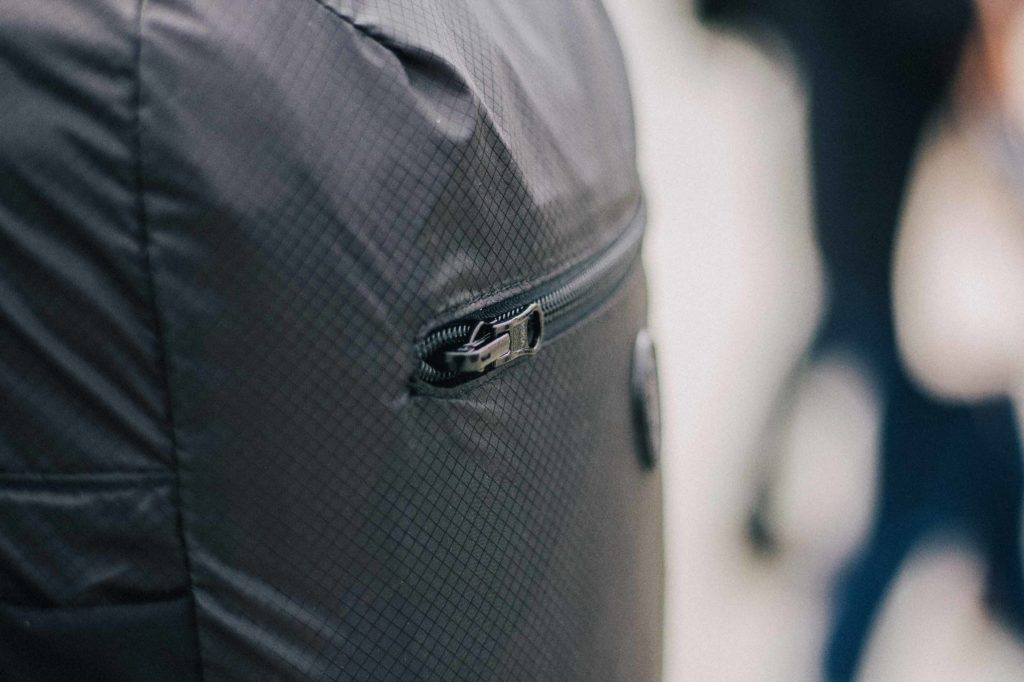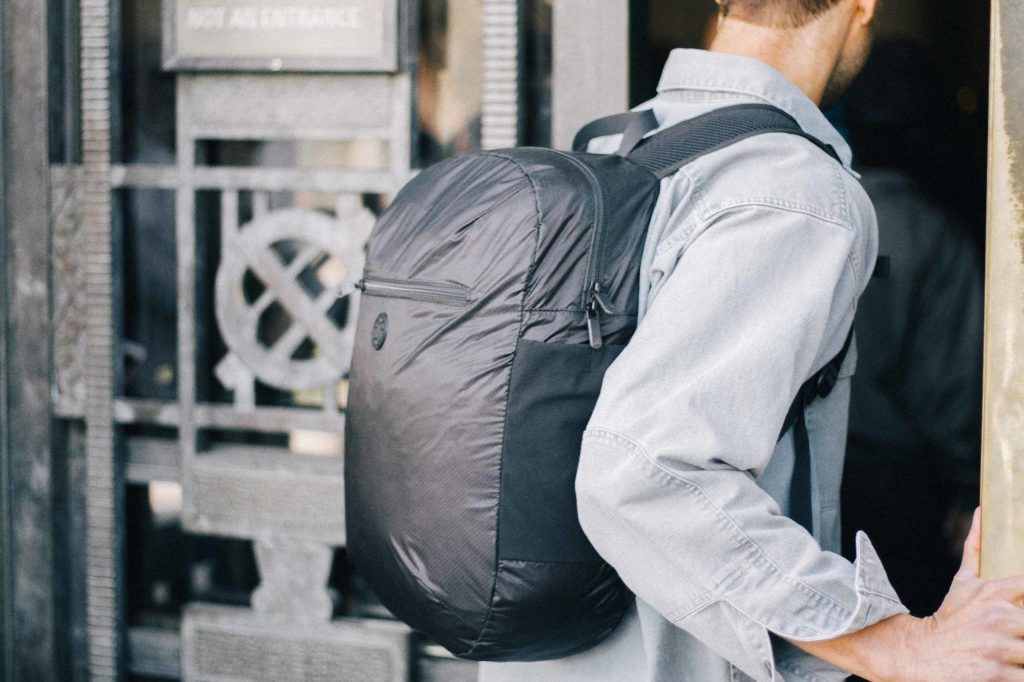Table of Contents
Travelers often ask us if nylon or polyester is the better fabric for backpacks.
People wrongly assume that nylon is tough and durable while polyester is cheap and low-quality. Both assumptions are wrong.
The short—but unsatisfying—answer is that both fabrics are perfectly suited for travel backpacks. We use both.
The truth is that nylon and polyester are more similar than different. Both are lighter, stronger, and more durable than traditional fabrics like cotton or leather.
Other factors like fabric weight, quality, sustainability, or look and feel will determine which fabric is right for you.
Let’s explore the similarities and differences between nylon and polyester in more depth.
How Nylon and Polyester are Made
Polyester and nylon are both plastic compounds derived from petroleum. Dupont researchers discovered both in the 1930s.
Both fabrics are both stronger, lighter, and more durable than the natural materials they typically replace.
Polyester and nylon plastics are made into fabric in similar ways. Both start as small pellets about the size and color of uncooked white rice. Fabric mills stretch out the pellets and join them together to form long strands of fiber. The fibers are combined to make thread. The thread is then woven or knit into large rolls of fabric. While the production details are slightly different, the process is similar for both polymers.

How Nylon and Polyester and Similar
Polyester and nylon are more similar than different.
Both fabrics are:
- Easy to care for
- Wrinkle resistant
- Mold, mildew, and stain resistant
Performance Trade Offs
Given all of the similarities, what are the advantages of each fabric?
Nylon’s Strengths
Nylon is softer than polyester. Despite this softness, nylon typically has a shinier appearance than polyester.
Nylon is stretchier than polyester which can be an advantage or a disadvantage depending on your use case. We’ll cover this in more depth in the next section on how each fabric reacts to water.
Lastly, Nylon has a higher strength-to-weight ratio than polyester meaning that a nylon bag can often be stronger than a polyester one without being heavier. However, nylon isn’t always “stronger” than polyester.
Polyester’s Strengths
Polyester has a finer thread so it can be woven with a higher thread count without increasing the thickness of the fabric which can partially make up for the lower strength-to-weight ratio.
Polyester also is more abrasion resistant than nylon. A polyester backpack will pill less so it will look newer longer than an equivalent nylon bag. Pilling can cause nylon to fray at its edges which can reduce the strength of the seams where the fabric is joined together.
Finally, polyester is more receptive to color dyes. Polyester holds color better and fades less than nylon when exposed to the sun’s UV rays. If you want a brightly colored or patterned bag, polyester is the best option.

Reactivity to Water
Nylon Absorbs Water
Nylon absorbs water and can stretch up to 3.5%.
To counter this problem, nylons typically have a durable, water-repellant (DWR) coating on the back side of the fabric. The DWR coating prevents water from soaking through the bag, but the fabric itself can still absorb water. When this happens, your backpack can stretch and feel heavier.
DWR coatings, lamination, and other waterproofing measures can overcome these issues in nylon. For example, our VX waterproof sailcloth fabrics have an internal support structure to prevent stretching. The waterproof membrane in the fabric prevents water from soaking through the bag. DWR coatings on the front and back layers prevent the fibers on either side from soaking up water.
Polyester Repels Water
Unlike nylon, polyester is hydrophobic: it repels water.
For this reason, a polyester bag won’t get heavier or stretch when exposed to moisture like a nylon backpack will.
A polyester backpack will also dry faster than a nylon one because it absorbs less water.
Reactivity to water isn’t just an issue in the rain. Nylon can also expand in humid climates like Southeast Asia and contract in dry, desert climates.

Recyclability
Recycled Nylon
Nylon is harder to recycle than polyester. Recycling nylon is expensive and resource intensive. Until recently, recycled nylon fabrics were rare.
Recycled nylon is usually made from pre-consumer recycled materials. Pre-consumer means that recycled nylons are made from factory waste, not trash that you put in the recycling bin.
Recycled Polyester
Polyester is easy and efficient to recycle. Recycled polyester can be made from post-consumer recycled materials like water bottles. As a result, a robust infrastructure exists to turn trash into premium, high performance fabrics for bags, shoes, and clothing. Recycled polyester isn’t ubiquitous yet but is becoming the norm for clothing and bag companies seeking to reduce their environmental footprints.
Using recycled polyesters helps us limit our dependence on raw petroleum, reduce trash in landfills, and reduce toxic emissions created by the trash disposal process.
Junyuan didn’t start as a “green” brand, but we do value sustainability. The Outbreaker Collection has a recycled polyester lining. We plan to continue expanding our use of recycled and environmentally-friendly fabrics.
Conclusion
Traditionally, nylon was used as a substitute for silk because of its soft, lustrous feel. Polyester found a natural home in outerwear due to its rough and tough nature. Over time, the differences between nylon and polyester have become less pronounced as researchers have developed new fabrics.
Nylon isn’t better than polyester. Polyester isn’t better than nylon. They have slight, but meaningful, differences that can make one better than the other in high performance situations like sailboats racing in the America’s Cup (polyester) or incredibly thin stockings (nylon).
The choice between nylon and polyester for a travel backpack is an aesthetic and value choice, not a matter of performance.
Ten articles before and after
The Best Mini Bluetooth Speakers for Travel – JUNYUAN Bags | Professional Bag Manufacturer
Money Belts: Do You Need One? – JUNYUAN Bags | Professional Bag Manufacturer
Best Yoga Mats for Travel – JUNYUAN Bags | Professional Bag Manufacturer
Best Travel Water Bottle: A Comparison Guide – JUNYUAN Bags | Professional Bag Manufacturer
Best Men's and Women's Fanny Packs for Travel | Professional Bag Manufacturer
The Best Travel Sized Toiletries to Pack for Your Trip | Professional Bag Manufacturer
Guide to the Best Travel Wallets for Men & Women – JUNYUAN Bags | Professional Bag Manufacturer




 Mobile/What's App/Wechat
Mobile/What's App/Wechat E-Mail
E-Mail ADD
ADD




